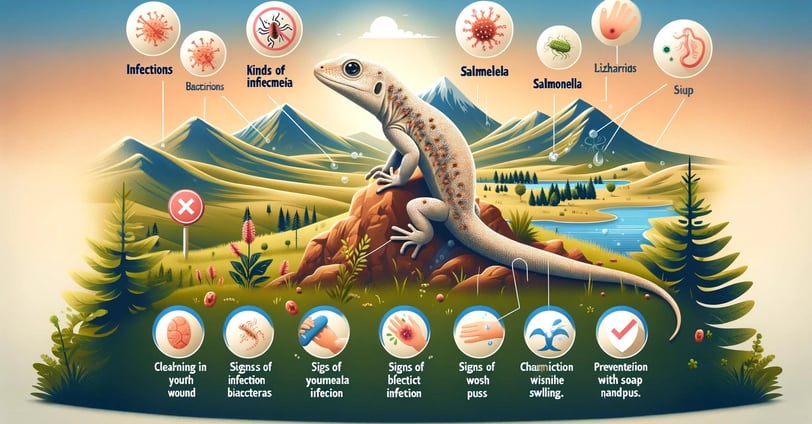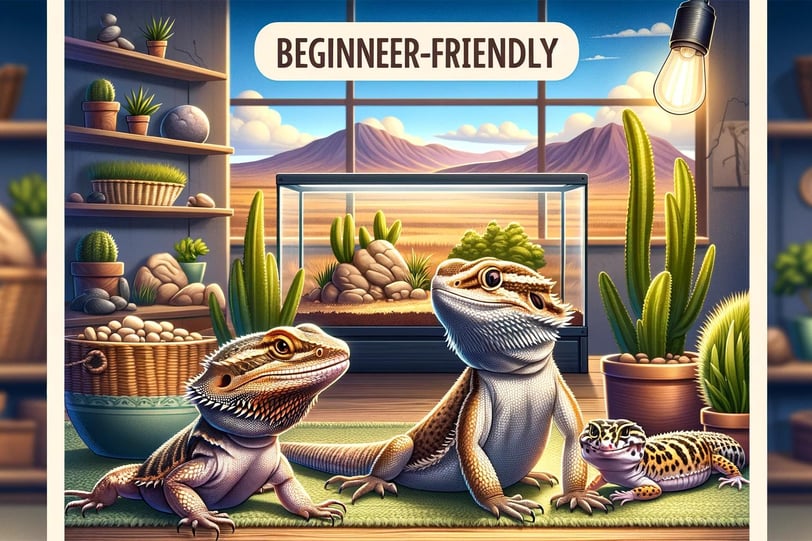Do Pet Lizards Bite? Understanding Your Scaly Companion's Behavior
Learn why pet lizards bite and how to prevent it. Find common triggers, safe handling tips, and how to care for your lizard to create a stress-free environment.
12/3/20246 min read


Introduction to Pet Lizards and Their Behavior
Do pet lizards bite? This is a common question among potential owners. Lizards make unique pets. People love their exotic nature. They are low maintenance. However, like any pet, lizards can bite. Understanding their behavior is crucial. Lizards communicate through body language. Observing helps understand their mood. Stress or fear can lead to biting. It's important to handle them properly. Create a calm environment for them. Pet lizards usually bite as a defense mechanism. Knowing their behavior patterns can prevent lizard bites. Most lizards are not aggressive. They bite only when provoked. Learning about their natural instincts is essential. Proper care and handling reduce bite risks. This blog will explore various aspects of lizard bites. We’ll also provide tips to prevent them. Understanding your pet’s behavior is key. Let's dive deeper into why lizards might bite.
Why Lizards Bite: Exploring Common Triggers
Do Pet Lizards Bite? Understanding Your Scaly Companion's Behavior


Handling Lizards Safely to Prevent Bites
Handling lizards properly is crucial. It minimizes the risk of bites. Approach your lizard calmly. Sudden movements can startle them. This can lead to bites. Use gentle and steady movements. Support their entire body. This makes them feel secure. Avoid handling them immediately after feeding. Lizards can be irritable during this time. Also, avoid handling them during shedding. They are more sensitive then. Clean your hands before and after handling. This removes any scents that might confuse them. Use both hands to support their body. This prevents them from feeling insecure. Creating a routine helps too. Lizards get accustomed to regular handling. It reduces their stress. Always observe their body language. Signs of stress include tail whipping or hissing. Give them space if they show these signs. Gentle and regular handling is key. It helps in building trust with your pet. Proper handling prevents lizard bites effectively.
Immediate Actions to Take After a Lizard Bite
If bitten by your lizard, stay calm. Wash the bite area with soap and water. This helps prevent infection. Apply an antiseptic to the wound. Cover it with a clean bandage. Observe the wound for any signs of infection. These include redness, swelling, or pus. Seek medical attention if these symptoms appear. "A small bite can cause big problems if not treated properly." Lizards can carry bacteria. It's essential to clean the wound thoroughly. Watch for signs of an allergic reaction. These include hives, difficulty breathing, or swelling of the face. Seek immediate medical help if these occur. Understanding what happens if a pet lizard bites you is crucial. Most bites are minor and heal quickly. However, proper care is necessary. Keep the bitten area clean and dry. Avoid scratching or irritating the wound. This speeds up healing. Proper wound care is essential to prevent complications.
Health Implications of a Lizard Bite
A lizard bite can cause minor health issues. Most bites are not serious. However, they can lead to infections. Lizards can carry bacteria like Salmonella. Cleaning the wound is crucial. Wash it with soap and water. Apply antiseptic to prevent infection. Cover it with a clean bandage. Monitor the bite for signs of infection. Redness, swelling, or pus indicates infection. Seek medical attention if these appear. Some people may have allergic reactions. Symptoms include hives, swelling, or difficulty breathing. Immediate medical help is needed in such cases. "Not all lizard bites are dangerous, but proper care is essential." Lizards can bite their owners for no reason. Understanding the health implications is important. Proper wound care prevents complications. Most bites heal without issues. However, awareness and prompt action are crucial. Knowing what happens if a pet lizard bites you helps in managing the situation effectively.


Lizards bite for several reasons. Fear and stress are primary triggers. When threatened, they bite to defend themselves. Lizards can bite their owners for no reason, seemingly. However, there is always a trigger. Loud noises or sudden movements can stress them. Another reason is mistaken identity. Lizards may bite fingers, mistaking them for food. Feeding time requires extra caution. Poor handling is another common cause. Lizards need to feel secure. Rough or sudden handling can lead to bites. Territorial behavior is also a factor. Some lizard species are naturally more aggressive. Understanding these triggers is vital. It helps in preventing lizard bites. Observing your lizard's behavior is crucial. Identifying stress signals can prevent bites. Creating a safe and calm environment is essential. Proper feeding techniques and gentle handling reduce bite risks. Knowing these common triggers can help. It ensures a safer interaction with your pet lizard.
Specific Reactions to Gecko Bites
Gecko bites are usually harmless. However, it's important to know what happens if a gecko bites you. Geckos have small teeth. Their bites can cause minor cuts. Clean the wound with soap and water. Apply antiseptic to prevent infection. Cover it with a bandage. Geckos, like other lizards, can carry bacteria. Proper wound care is essential. Observe the bite for signs of infection. These include redness, swelling, or pus. Seek medical attention if these appear. Geckos can bite if stressed or scared. Understanding their behavior is important. Handling them gently reduces the risk of bites. "Gecko bites are usually minor but should be treated promptly." Knowing the specific reactions to gecko bites helps. It ensures proper care and prevents complications. Geckos are generally docile. With proper handling, bites can be minimized. Awareness and prompt action are key to managing gecko bites effectively.
Identifying and Preventing Common Lizard Biting Behaviors
Recognizing lizard biting behaviors is crucial. It helps in preventing bites. Lizards bite mainly due to fear or stress. Observing their body language can help. Signs of stress include tail whipping and hissing. If you notice these, give them space. "Preventing lizard bites starts with understanding their behavior." Another sign is rapid breathing. This indicates stress or fear. Avoid handling them during these times. Feeding time is also crucial. Lizards can bite if they mistake your fingers for food. Use feeding tongs to avoid this. Creating a calm environment helps. Loud noises and sudden movements can stress lizards. Keep their habitat quiet and stable. Proper handling is essential. Support their entire body and avoid sudden movements. Regular, gentle handling reduces stress. Identifying and addressing these behaviors can prevent bites. It ensures a safer interaction with your pet lizard. Awareness and proper care are key.
Non-Biting Lizard Species: Ideal Pets for Beginners
Some lizard species are less likely to bite. They make ideal pets for beginners. Bearded dragons are one such species. They are known for their docile nature. Blue-tongued skinks are also good options. They are friendly and easy to handle. Leopard geckos are popular too. They rarely bite and are low maintenance. Understanding what types of lizards don't bite helps in choosing a pet. These species are known for their calm temperament. They are suitable for first-time lizard owners. Proper care and handling are still important. Even docile lizards can bite if stressed. "Choosing a non-biting species makes pet ownership easier and more enjoyable." It's important to research and understand your chosen species. Providing a suitable environment and handling them properly ensures a positive experience. These non-biting lizard species are ideal for those new to reptile keeping.


Are House Lizards Poisonous?
House lizards are not poisonous. They pose no significant threat to humans. However, they can carry bacteria like Salmonella. It's important to handle them properly. Washing your hands after handling is crucial. "House lizards are harmless but hygiene is important." They can bite if threatened. Proper care reduces this risk. Their bites are usually minor. Cleaning the wound is essential to prevent infection. House lizards are often seen in homes. They help in controlling insect populations. Understanding their behavior and potential risks is important. Knowing that house lizards are not poisonous helps in managing interactions with them. Proper hygiene and handling prevent health issues. House lizards are generally harmless. Awareness and proper care ensure a safe coexistence with these creatures. Their presence can be beneficial, and with proper precautions, they pose no significant danger.
Conclusion: Creating a Safe and Enjoyable Environment for Your Lizard
Understanding lizard behavior is key. It helps in preventing bites and ensuring a positive pet-owner relationship. Do pet lizards bite? Yes, but usually for reasons like fear or stress. Proper handling and care minimize the risk. Choosing non-biting species is ideal for beginners. Recognizing stress signals and creating a calm environment ensures safety. Observing their body language is essential. Gentle handling builds trust. Awareness and proper care prevent complications. Knowing what to do if bitten is crucial. Proper wound care is important. Creating a safe environment reduces stress. A calm habitat and routine handling help. Understanding lizards and respecting their space is key. It leads to a harmonious relationship. Lizards make unique and fascinating pets. Proper care and understanding ensure a positive experience. Safe and enjoyable interactions are possible with knowledge and care.
Blogging
Your go-to platform for top blogging insights.
Connect
Explore
info@blogwaly.com
+92-316-8810243
© 2024. All rights reserved.
